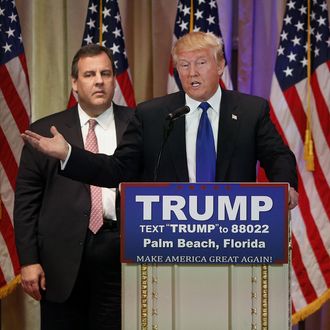
Donald Trump’s Super Tuesday speech started strange and then got stranger. First, a dead-eyed Chris Christie just barely pushed an introduction past his lips, monotonously intoning something about how the man tearing apart the Republican Party was a “unifier.” Then the New Jersey governor made way for the GOP front-runner — but too little way. For reasons that may or may not have to do with karmic justice, Christie’s pained face remained in view for the entirety of future President Trump’s remarks.
And those remarks were … low-energy. Early in his campaign, Trump promised supporters that America was going to win so much under his presidency, they would all eventually “get bored of winning.” Trump had won five states when he took the stage at the Mar-a-Lago, and he sounded like he was already bored. Either that or like he had just realized the gravity of his situation. He spent the early part of his speech touting the number of people “we employ” in various states — the “we” being his company, not his campaign. Trump was closer than he’d ever been to becoming president and yet was referring to himself as though he were still a private citizen.
But then Trump’s remarks turned to the economy, and the mogul’s tone started to seem less lethargic than it was measured; even-keeled; almost presidential.
“The middle-class has really been forgotten in this country,” Trump said. “We’ve lost our manufacturing jobs. Millions and millions of jobs. Thousands and thousands of plants. We are losing so much. We can’t let it happen.”
By itself, this is just boilerplate Trump. But in his unprecedented post-victory-speech press conference, the Donald refined his economic fatalism into a general-election argument that should make Democrats a little nervous.
“People in the middle-income groups are making less money than they were 12 years ago,” Trump correctly observed. “And in her speech, [Hillary Clinton] said ‘they’re making less money.’ Well, she’s been there with Obama for a long period of time. Why hasn’t she done anything about it?”
It’s difficult to imagine a Trump nomination being anything but a boon for the Democratic Party. But in that moment, Trump made it a little less difficult. Here was a man so media-savvy, he was the first candidate to ever realize you could get an extra half-hour of coverage by taking questions after your victory lap. A man so dominant, he had reduced the biggest bully in New Jersey to a miserable lackey. And, most critically, a man with a question that Hillary Clinton has no satisfying way to answer.






























